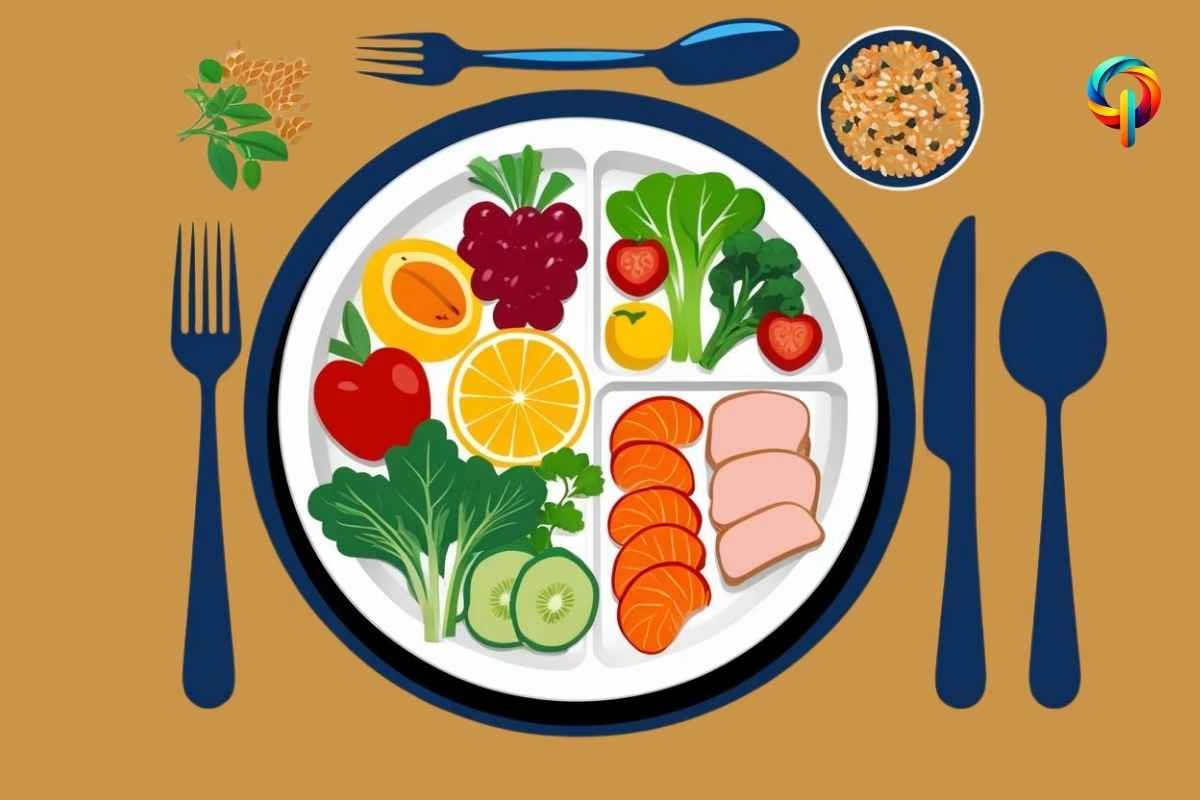
This piece highlights why balanced diets are key to staying healthy and creating a better future. It breaks down the basics—like carbs, proteins, healthy fats, and those all-important vitamins and minerals—explaining what they do and where to find them. The focus is on mixing things up with whole, fresh foods to ward off diseases, boost your energy and focus, and even help the planet by making smarter food choices. The takeaway? Eating well isn’t just about feeling good now; it’s about building a healthier world for the next generation, too.
Contents Of The Article
How Can a Balanced Diet Support Future Generations?
When we talk about a balanced diet or healthy diet ,we’re discussing more than just what’s on your plate—it’s about fueling your body for peak performance, maintaining long-term health, and even contributing to a more sustainable planet.
A healthy diet combines all the essential nutrients in appropriate proportions to meet your body’s energy needs and keep your systems running smoothly.
But why does this concept matter so much for the future? It’s because the way we eat today shapes not only our personal health but also the well-being of future generations and the planet itself.
Understanding a balanced diet:
Think of a balanced diet as your body’s ultimate support system—it gives you the energy to tackle the day, helps you grow, and keeps things running smoothly inside. The magic lies in getting the right mix of macronutrients like carbs, proteins, and fats, along with essential vitamins and minerals.
And here’s the real trick: variety is everything! Picture a plate that’s as colorful as a rainbow, with plenty of veggies, whole grains, lean proteins, good fats, and a sprinkle of superfoods. Not only does it look amazing, but it also makes sure your body gets all the fuel and nutrients it needs to thrive.
The Power of Macronutrients
Macronutrients are like the main ingredients in your favorite recipe. Carbs are your body’s go-to energy source, proteins are the building blocks that repair and strengthen your muscles, and fats (the healthy kind!) keep your brain, hormones, and overall system in tip-top shape. Each one has a unique job, so skipping out on any of them can leave you feeling off your game.
Micronutrients: Small but Mighty
Micronutrients might not get as much hype as carbs or proteins, but they’re the unsung heroes of your diet. Vitamins and minerals work behind the scenes, helping with everything from keeping your immune system strong to boosting your energy levels and supporting healthy bones. You don’t need a ton of them, but even small amounts can have a big impact on how you feel and function. So, don’t underestimate the little guys—they’re essential to keeping you at your best!
Core Components of a Balanced Diet
Carbohydrates: Fueling Your Life
Carbohydrates are your body’s primary energy source.
Human foods like rice, bread, pasta, and starchy vegetables provide the glucose your brain and muscles need to function. However, opt for whole grains over refined carbs—they release energy slowly, keeping you energized throughout the day.
Proteins: Essential for Growth and Repair
Proteins are indispensable for building and repairing tissues. Found in meat, fish, eggs, and plant-based sources like lentils and tofu, they play a pivotal role in muscle growth and immune function. A balanced or healthy diet ensures you’re consuming just the right amount to avoid strain on your kidneys.
Healthy Fats: Necessary for Vital Functions
Fats often get a bad rap, but the right ones—like those from nuts, seeds, avocados, and fish—are critical for brain health, hormone production, and absorbing fat-soluble vitamins (A, D, E, and K). Trans fats, on the other hand, should be avoided as they can lead to heart issues.
Vitamins and Minerals: The Micronutrient Marvels
These are the unsung heroes of your diet. Vitamins like C and D and minerals like calcium and iron are vital for everything from immune defense to bone health. Fruits, vegetables, and dairy products are excellent sources.
Standard Balanced Diet Menu
Let’s talk about why following a standard diet menu is such a game-changer for a healthy lifestyle. Think of it as your cheat sheet to getting all the essential nutrients your body needs to feel amazing—inside and out.
Now, don’t worry—it’s not some hardcore rulebook. It’s more like a friendly guide to help you eat smarter. By sticking to a balanced diet, you can cut down the risk of chronic illnesses and boost your overall vibe. Oh, and bonus—it’s a super easy way to hit your daily nutrition goals and keep that healthy weight in check without stressing out. So, why not give it a shot? You might just love how it makes you feel!
Detailed Breakdown of a Standard Balanced Diet Menu
1. Breakfast
Meal:
- Oatmeal Bowl:
- 1/2 cup rolled oats (cooked with 1 cup almond milk or low-fat milk and 1/2 cup water)
- Toppings: 1 tablespoon chia seeds, 1/2 sliced banana, a handful of blueberries
- 1 boiled egg or a small handful of almonds (10–12 almonds)
- 1 cup of green tea or black coffee (optional, without sugar)
Why This Works:
- Oats: Provides sustained energy with complex carbohydrates and fiber.
- Chia Seeds: Rich in omega-3 fatty acids, fiber, and protein.
- Banana and Blueberries: Natural sweetness with vitamins and antioxidants.
- Egg or Almonds: High-quality protein and healthy fats for muscle repair and brain function.
- Green Tea: Antioxidants supporting metabolism and overall health.
2. Mid-Morning Snack
Meal:
- 1 medium apple or any seasonal fruit (e.g., orange, pear)
- 1 small handful of walnuts (about 6–8 halves)
Why This Works:
- Apple: Low-calorie, fiber-rich, and full of vitamin C for digestion and immunity.
- Walnuts: Healthy fats (omega-3s), protein, and antioxidants supporting brain health and reducing inflammation.
3. Lunch
Meal:
- 1 cup cooked quinoa or brown rice
- 100–120g grilled chicken breast or tofu/tempeh for vegetarians
- 1.5 cups mixed vegetables (e.g., steamed broccoli, carrots, and zucchini)
- 1 tablespoon olive oil for dressing or cooking
- 1 small bowl of salad (e.g., mixed greens, cherry tomatoes, cucumber, with a squeeze of lemon)
Why This Works:
- Quinoa/Brown Rice: Complex carbs, fiber, and essential amino acids (especially in quinoa).
- Chicken/Tofu: Lean protein for muscle repair and immune function.
- Mixed Vegetables: Vitamins (A, C, K), minerals (iron, potassium), and fiber for overall health.
- Olive Oil: Monounsaturated fats for heart health.
- Salad: Freshness, hydration, and additional nutrients.
4. Afternoon Snack
Meal:
- 1 cup Greek yogurt (unsweetened, low-fat)
- 1 tablespoon flaxseeds or pumpkin seeds
- 1 small piece of dark chocolate (70% cocoa or higher, optional)
Why This Works:
- Greek Yogurt: High in protein and probiotics for gut health and muscle repair.
- Flaxseeds/Pumpkin Seeds: Omega-3 fatty acids, fiber, and minerals like magnesium.
- Dark Chocolate: Antioxidants and a treat to satisfy sweet cravings without added sugar.
5. Dinner
Meal:
- 100–120g baked salmon or grilled tofu
- 1/2 cup mashed sweet potatoes or 1 small roasted sweet potato
- 1 cup sautéed spinach or kale (cooked with garlic and a teaspoon of olive oil)
- 1 small bowl of lentil soup or a side of steamed green beans
Why This Works:
- Salmon/Tofu: Omega-3 fatty acids (salmon) for brain and heart health; plant-based protein (tofu) for vegetarians.
- Sweet Potatoes: Complex carbs, fiber, and vitamin A (beta-carotene).
- Spinach/Kale: Iron, calcium, and vitamin K for bone health and blood circulation.
- Lentil Soup/Green Beans: Fiber, protein, and additional nutrients to complete the meal.
6. Evening Snack (Optional)
Meal:
- 1 small handful of mixed nuts (e.g., almonds, cashews, walnuts)
- 1 cup herbal tea (e.g., chamomile or peppermint)
Why This Works:
- Mixed Nuts: Healthy fats, protein, and minerals like magnesium and zinc.
- Herbal Tea: Promotes relaxation and hydration without caffeine.
Hydration
- Drink 8–10 glasses of water throughout the day.
- Herbal teas or infused water (e.g., lemon or cucumber) can also count towards hydration.
Why This Matters: Proper hydration supports digestion, energy levels, and overall bodily functions.
Key Takeaways from This Menu:
Balanced Macronutrients:
- Carbs: Oats, quinoa, sweet potatoes, fruits, and vegetables.
- Proteins: Chicken, salmon, tofu, eggs, Greek yogurt, and lentils.
- Fats: Olive oil, nuts, seeds, and avocado.
Rich in Micronutrients:
- Vitamins: A, C, D, E, K from fruits, vegetables, and whole grains.
- Minerals: Iron, calcium, magnesium, and potassium from greens, nuts, and seeds.
Fiber-Rich: Supports digestion, gut health, and keeps you full longer.
Low in Processed Foods: Focuses on whole, nutrient-dense foods to avoid empty calories.
How to Adjust for Specific Needs:
- For Weight Loss: Slightly reduce portion sizes, especially for calorie-dense foods like nuts, oils, and grains.
- For Weight Gain: Increase portion sizes, particularly proteins and healthy fats (e.g., add extra servings of nuts or avocado).
- For Athletes or Highly Active Individuals: Add extra servings of carbs (e.g., another 1/2 cup of quinoa or sweet potato) and protein (e.g., an extra egg or a protein shake).
This refined breakdown emphasizes the balance of nutrients and provides detailed reasons for each food choice, ensuring a comprehensive understanding of a standard balanced diet. Hope this helps!
Tips for a Balanced Diet
- Plan Your Meals:
- Prepare your meals ahead of time to avoid impulsive eating.
- Keep a variety of healthy snacks on hand to prevent unhealthy cravings.
- Stay Hydrated:
- Drink water throughout the day, even if you don’t feel thirsty.
- Carry a reusable water bottle to keep track of your intake.
- Portion Control:
- Use smaller plates to help manage portion sizes.
- Listen to your body’s hunger cues and avoid overeating.
- Include a Variety of Foods:
- Rotate different fruits, vegetables, proteins, and grains in your diet to ensure you get a wide range of nutrients.
- Experiment with new recipes to keep meals interesting and nutritious.
- Mindful Eating:
- Eat slowly and savor each bite to enjoy your food and recognize when you’re full.
- Avoid distractions like TV or smartphones while eating to focus on your meal.
- Limit Processed Foods:
- Opt for whole foods as much as possible, avoiding processed snacks and ready-made meals.
- Read labels to identify hidden sugars, sodium, and unhealthy fats.
- Healthy Substitutions:
- Swap refined grains for whole grains (e.g., brown rice instead of white rice).
- Use herbs and spices instead of salt for flavor.
- Regular Physical Activity:
- Combine your balanced diet with regular exercise to maintain a healthy weight and improve overall well-being.
- Find an activity you enjoy, whether it’s walking, cycling, dancing, or yoga.
- Manage Stress:
- Practice stress-relief techniques like meditation, deep breathing, or hobbies you love.
- Ensure you get enough sleep, as rest is crucial for overall health.
- Consult Professionals:
- If you have specific health goals or dietary needs, consult a registered dietitian or nutritionist.
- Keep regular check-ups with your healthcare provider to monitor your progress and make necessary adjustments.
Importance of a Balanced Diet for the Future
Promoting Health and Preventing Diseases
The rise of chronic diseases like diabetes, obesity, and heart conditions is a major concern. A healthy diet, rich in whole foods and low in processed junk, helps prevent these ailments and boosts longevity.
Enhancing Mental and Physical Performance
Good nutrition doesn’t just affect your body—it’s also essential for your mind. A diet rich in omega-3s, antioxidants, and complex carbs can improve memory, focus, and mood, ensuring you’re at your best mentally and physically.
Fostering Sustainability in Food Choices
With climate change threatening our future, sustainable eating is more important than ever. Incorporating plant-based foods, reducing waste, and choosing local produce minimizes your carbon footprint while supporting a healthier planet.
FAQs About healthy Diets
Q1: What is a balanced diet?
A balanced diet is like giving your body the perfect toolkit! It includes all the major nutrients—carbs for energy, proteins for building and repairing tissues, healthy fats for brain power and energy storage, plus vitamins and minerals to keep your body functioning smoothly. The goal? To give your body everything it needs to thrive without overloading it with unnecessary stuff. Think colorful veggies, whole grains, lean proteins, and healthy fats on your plate!
Q2: Can a balanced diet reduce disease risks?
Absolutely! A balanced diet plays a big role in lowering the risks of chronic illnesses like diabetes, heart disease, and even certain cancers. It helps manage blood sugar levels, keeps your cholesterol in check, and provides antioxidants that fight off harmful free radicals. Plus, maintaining a healthy weight through balanced eating reduces stress on your organs. So, a balanced diet isn’t just about food—it’s a long-term investment in your health!
Q3: How do I start eating balanced meals?
Starting is easier than you think! Fill half your plate with a mix of colorful veggies (like spinach, carrots, or broccoli), a quarter with lean protein (think chicken, fish, tofu, or beans), and the last quarter with whole grains (brown rice, quinoa, or whole-grain bread). Don’t forget a small portion of healthy fats, like avocado or a drizzle of olive oil. Planning ahead and meal-prepping can make this even easier. Your body will thank you for the effort!
Q4: Are fats necessary in a balanced diet?
You bet they are! Healthy fats are essential for your brain and nervous system, providing energy and helping your body absorb fat-soluble vitamins like A, D, E, and K. Good sources include avocados, nuts, seeds, fatty fish (like salmon), and olive oil. But be mindful of portion sizes—fats are calorie-dense, so a little goes a long way. Avoid trans fats found in processed foods and stick to the healthy stuff for maximum benefits!
Q5: How can balanced diets promote sustainability?
Eating balanced doesn’t just help you—it’s good for the planet too! By reducing meat consumption and incorporating more plant-based foods like legumes, nuts, and veggies, you help conserve water, land, and energy resources. Plant-based options also produce fewer greenhouse gases, which is a win for the environment. Small changes, like participating in “Meatless Mondays” or sourcing locally grown produce, can make a big difference in promoting sustainability while keeping your meals nutritious and delicious.
Final Thoughts
A balanced diet isn’t just about eating well today—it’s about creating a foundation for long-term health and sustainability.
By understanding and adopting this approach, you not only fuel your body with the nutrients it needs but also make mindful choices that benefit future generations.
The future of health is in your hands, and it begins with what’s on your plate.
Eat smart, live well, and ensure a thriving tomorrow for everyone.





